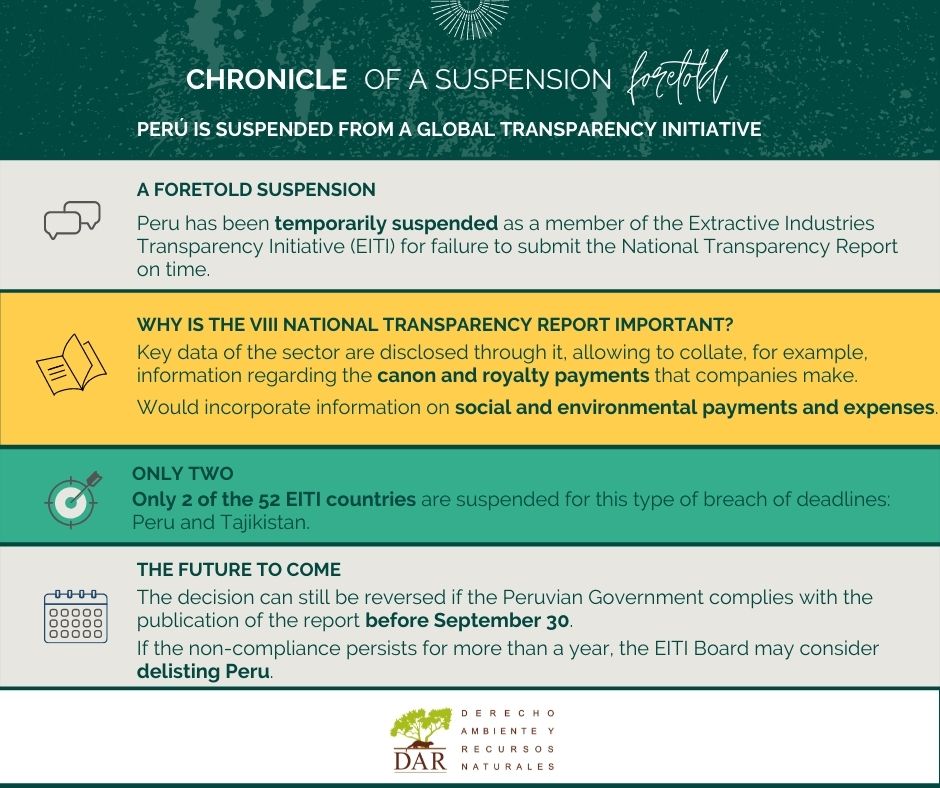Lima, May 9th, 2022.- Peru has been temporarily suspended as a member of the Extractive Industries Transparency Initiative (EITI) for failure to submit the National Transparency Report on time, which is one of the central commitments within the framework of the Initiative. Through this report, key data of the sector are disclosed, allowing to collate, for example, information regarding the canon and royalty payments that companies make to the Government, and information on social and environmental payments and expenses, reported the Civil Association Derecho, Ambiente y Recursos Naturales.
The decision made by the International Board of the Initiative through Decision No. 2022-22, comes after Peru exceeded the deadline of March 31 to present the report corresponding to the years 2019-2020.
Said decision can still be reversed, if the Peruvian Government complies with the publication of the report before September 30. Otherwise, if the non-compliance persists for more than a year, the EITI Board may consider delisting Peru.
Regarding this decision, Vanessa Cueto, vice president of DAR and representative of civil society in the EITI National Board, comments: “DAR has been warning of the breach of this commitment assumed by the Peruvian State, even before the International Secretariat of the EITI visited the country in March. With this suspension, Peru -together with Tajikistan- become the only two countries out of 52 members of the Initiative to find themselves suspended for missing deadlines”.
We must remember that the Ministry of Mining and energy (MINEM) is the entity in charge of financing the preparation of the aforementioned Report, and to date no transparency reports have been prepared in the regions with EITI subnational Commissions (Loreto, Piura, Arequipa, Moquegua and Apurímac).
Environmental transparency in times of spills
During the last decade, more than 470 spills have affected the Peruvian Amazon, an alarming number due to the impacts on life, health and the environment that they bring with them. For instance, the case of the oil spill in La Pampilla, which contaminated 46 beaches according to the Report of the Ombudsman’s Office, is already considered by international media as the worst spill in Peru. The deficiencies in terms of transparency and access to socio-environmental information have been notorious and constant, which was evidenced by the beginning of an administrative procedure linked to the delivery of false or insufficient information on issues as sensitive as the Preliminary Report of the environmental disaster.
In this context, initiatives such as the EITI are fundamental as spaces for interaction between the Government, companies and civil society, which contribute to the sustainable development of the country and the quality of life of local populations. All of this can be achieved through transparency and access to information. For this reason, Peru’s temporary suspension of the initiative represents a serious blow to environmental governance in the country.
For this reason, it’s urgent that the peruvian Ministry of Energy and Mines give priority to the preparation of the EITI’s VIII National Transparency Report, also taking into account that the OECD recommends the implementation of the EITI as a good practice (recommendation No. 66). Likewise, civil society must be vigilant to the fulfillment of Peru’s commitments, in order to guarantee good governance in the extractive industries in Peru.


